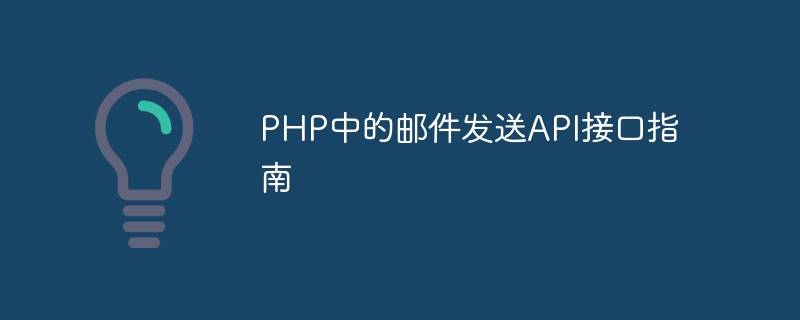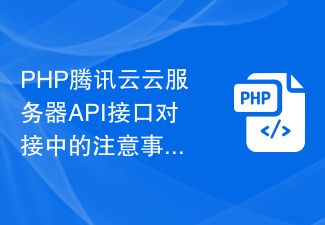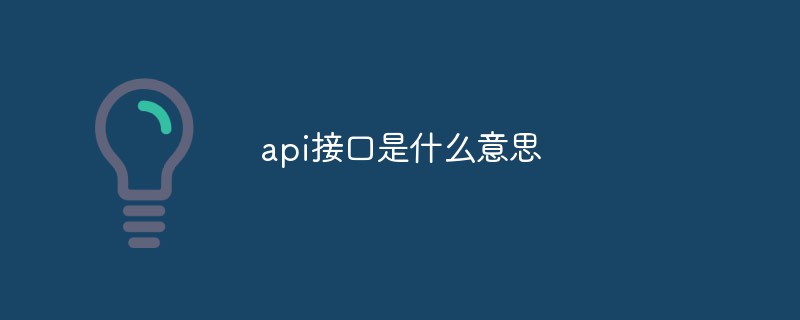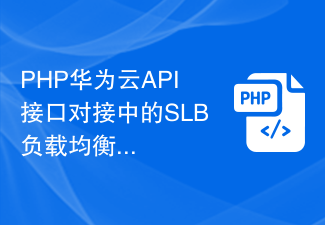 Backend Development
Backend Development PHP Tutorial
PHP Tutorial Tips in PHP development - how to use API interfaces to obtain and process real-time data?
Tips in PHP development - how to use API interfaces to obtain and process real-time data?
Tips in PHP development—how to use API interfaces to obtain and process real-time data?
With the development of the Internet, API interfaces have become an indispensable part of modern software development. It allows data interaction and communication between different applications, and enables the expansion and integration of various functions. In PHP development, we can use API interfaces to achieve real-time data acquisition and processing, providing timely and accurate data support for our applications.
So, how to use API interface to obtain and process real-time data? The following will introduce you to some common techniques and sample code in detail.
- Use curl library to send API requests
curl is a very commonly used network transmission tool and an extension library in PHP. By using the curl library, we can easily send HTTP requests and get the data returned by the API interface. The following is a sample code:
$url = 'http://api.example.com/data'; // API接口的URL地址 $ch = curl_init(); // 初始化curl curl_setopt($ch, CURLOPT_URL, $url); // 设置请求的URL地址 curl_setopt($ch, CURLOPT_RETURNTRANSFER, 1); // 将请求的结果以字符串返回,而不是直接输出 $response = curl_exec($ch); // 执行curl请求 curl_close($ch); // 关闭curl $data = json_decode($response, true); // 将返回的JSON字符串转换为数组
In the above code, we first define the URL address of the API interface, then use the curl_setopt function to set some request options, and finally use the curl_exec function to execute the request and obtain the returned data . Finally, we use the json_decode function to convert the returned JSON string into an array.
- Processing data returned by the API interface
After obtaining the data returned by the API interface, we generally need to process and parse it to meet our specific needs. The following is a sample code that demonstrates how to parse the JSON data returned by the API interface:
foreach ($data['items'] as $item) {
$id = $item['id'];
$name = $item['name'];
$url = $item['url'];
// 对每个数据进行处理或保存到数据库
// ...
}In the above code, we first traverse the data returned by the API interface through a foreach loop, and then extract the id in each piece of data as needed , name and url, and perform further processing or save to the database.
- Handling the error information of the API interface
In actual development, the API interface may return error information under certain circumstances. In order to ensure that our application can correctly handle these errors, we need to judge the returned data and process it accordingly. The following is a sample code that demonstrates how to handle the error information returned by the API interface:
$status = $data['status'];
$message = $data['message'];
if ($status != 'success') {
// 出现错误,根据错误信息进行相应的处理
// ...
}In the above code, we first determine whether the status field in the returned data is 'success', and if not, the API The interface returned error information. We can perform corresponding processing based on the specific error information in the message field, such as outputting error messages, recording logs, etc.
Through the above sample code, we can see that it is not complicated to use the API interface to obtain and process real-time data. You only need to use the curl library to send requests, parse the returned data, and handle error messages to achieve real-time data acquisition and processing. Of course, the specific implementation method must be flexibly used according to specific business needs and API interface requirements.
Summary: By utilizing API interfaces, we can easily achieve real-time data acquisition and processing in PHP applications. During the development process, you need to pay attention to selecting appropriate network transmission tools, such as the curl library, processing and parsing the returned data, and handling possible error messages. Only by mastering these skills and implementing them according to specific needs can we achieve more efficient and stable application development.
The above is the detailed content of Tips in PHP development - how to use API interfaces to obtain and process real-time data?. For more information, please follow other related articles on the PHP Chinese website!
 PHP中的邮件发送API接口指南May 21, 2023 pm 12:12 PM
PHP中的邮件发送API接口指南May 21, 2023 pm 12:12 PM随着电子邮件在我们日常生活中的普及,邮件发送成为了许多应用程序中必不可少的功能。PHP作为一种流行的Web开发语言,也提供了相应的邮件发送API接口。本文将为初学者和开发者介绍PHP中的邮件发送API接口,包括如何配置邮件服务器、如何使用PHP内置的邮件函数以及如何使用第三方邮件发送库。一、配置邮件服务器在使用PHP发送邮件之前,你需要首先配置一个SMTP服
 如何在ECharts中实现实时数据更新Dec 17, 2023 pm 02:07 PM
如何在ECharts中实现实时数据更新Dec 17, 2023 pm 02:07 PMECharts是一款开源的可视化图表库,支持各种图表类型以及丰富的数据可视化效果。在实际场景中,我们常常需要实现实时数据的展示,也就是当数据源发生变化时,图表能够即时更新并呈现最新的数据。那么,如何在ECharts中实现实时数据更新呢?以下是具体的代码演示示例。首先,我们需要引入ECharts的js文件和主题样式:<!DOCTYPEhtml>
 PHP腾讯云云服务器API接口对接中的注意事项和技巧Jul 06, 2023 am 10:13 AM
PHP腾讯云云服务器API接口对接中的注意事项和技巧Jul 06, 2023 am 10:13 AMPHP腾讯云云服务器API接口对接中的注意事项和技巧腾讯云作为国内领先的云计算平台提供商,其云服务器(CVM)产品受到了众多开发者和企业的青睐。为了更好地实现与腾讯云云服务器的对接,腾讯云提供了丰富的API接口,方便开发者进行各种操作和管理。本文将介绍在PHP环境下对接腾讯云云服务器API接口时需要注意的事项和一些技巧。同时,我们将给出一些代码示例,以便更好
 用PHP构建一个微信公众号API接口May 13, 2023 pm 12:01 PM
用PHP构建一个微信公众号API接口May 13, 2023 pm 12:01 PM在当今互联网时代,微信公众号成为了越来越多企业的重要营销渠道。想要自己的微信公众号实现更多的功能,常常需要编写相应的接口。本文将以PHP语言为例,介绍如何构建一个微信公众号API接口。一、前置准备在编写微信公众号API接口之前,需要开发者拥有一个微信公众号的账号,并且在微信公众平台中申请开发者接口权限。申请成功后,可以获取到相关的开发者AppID和AppSe
 如何使用 Go 语言进行实时数据采集?Jun 10, 2023 pm 05:46 PM
如何使用 Go 语言进行实时数据采集?Jun 10, 2023 pm 05:46 PM随着物联网技术的不断发展,实时数据采集已经成为了数字化时代不可或缺的一部分。而在各种编程语言中,Go语言以其高效的并发性能和简洁的语法,成为了实时数据采集的一种理想选择。本文将介绍如何使用Go语言进行实时数据采集。一、数据采集框架的选择在使用Go语言进行实时数据采集之前,我们需要选择一个适合我们的数据采集框架。目前市面上比较流行的数据采集框架包括
 利用MySQL开发实现实时数据同步的项目经验探讨Nov 03, 2023 am 08:39 AM
利用MySQL开发实现实时数据同步的项目经验探讨Nov 03, 2023 am 08:39 AM利用MySQL开发实现实时数据同步的项目经验探讨引言随着互联网的迅速发展,数据的实时同步成为了各个系统之间的重要需求。MySQL作为一种常用的数据库管理系统,在实现实时数据同步方面具有广泛的应用。本文将探讨在开发过程中,利用MySQL实现实时数据同步的项目经验。一、需求分析在进行数据同步项目开发之前,首先需要进行需求分析。明确数据源和目标数据库之间的数据同步
 api接口是什么意思Mar 13, 2023 pm 03:15 PM
api接口是什么意思Mar 13, 2023 pm 03:15 PMapi接口的意思是应用程序编程接口,它是一些预先定义的函数,目的是提供应用程序与开发人员基于某软件或硬件得以访问一组例程的能力;良好的接口设计可以降低系统各部分的相互依赖,提高组成单元的内聚性,降低组成单元间的耦合程度,从而提高系统的维护性和扩展性。
 PHP华为云API接口对接中的SLB负载均衡与CDN加速配置示例Jul 05, 2023 am 08:22 AM
PHP华为云API接口对接中的SLB负载均衡与CDN加速配置示例Jul 05, 2023 am 08:22 AMPHP华为云API接口对接中的SLB负载均衡与CDN加速配置示例在进行PHP华为云API接口对接时,常常需要考虑到负载均衡和CDN加速的配置。本文将给出一个示例,介绍如何使用PHP代码配置SLB负载均衡和CDN加速。一、SLB负载均衡配置示例SLB(ServerLoadBalancer)是华为云提供的一种高可用的负载均衡服务。它通过将来自用户请求转发到多


Hot AI Tools

Undresser.AI Undress
AI-powered app for creating realistic nude photos

AI Clothes Remover
Online AI tool for removing clothes from photos.

Undress AI Tool
Undress images for free

Clothoff.io
AI clothes remover

AI Hentai Generator
Generate AI Hentai for free.

Hot Article

Hot Tools

Safe Exam Browser
Safe Exam Browser is a secure browser environment for taking online exams securely. This software turns any computer into a secure workstation. It controls access to any utility and prevents students from using unauthorized resources.

SublimeText3 Linux new version
SublimeText3 Linux latest version

SublimeText3 Chinese version
Chinese version, very easy to use

Notepad++7.3.1
Easy-to-use and free code editor

SublimeText3 Mac version
God-level code editing software (SublimeText3)





